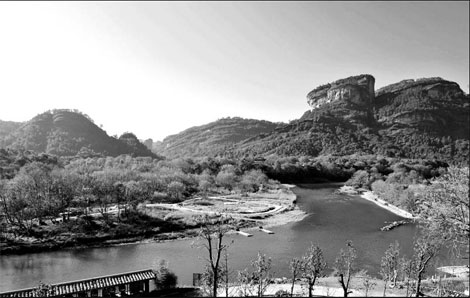Ecology crucial in Fujian growth
|
With forests covering 63 percent of the land, Fujian enjoys one of the most intact natural environments in China. |
One of the mainland's best-preserved environments prized by locals
A crucial component in the State Council-approved Western Straits Economic Zone, Fujian has boomed in recent years as a manufacturing base for businesses from Taiwan and the mainland, as well as international firms.
As development continues, the people of Fujian are concerned that growth could become costly for one of the best-preserved ecological environments in China.
In response provincial authorities have assured the public that Fujian won't follow the path of "environmental protection after development", an approach widely used across the country.
The ecology of Fujian is a subject of local pride. Forests cover 63 percent of the province, the highest ratio in the nation. Various nature reserves and forest parks account for 11 percent of the land at present.
Local authorities said they also prize Fujian's natural beauty and resources, so they set strict environment standards for industrial and infrastructure projects.
Even a decade ago, the provincial government denied approval to a large petrochemical project in Xiamen funded by a renowned company from Taiwan that would have made the city a leading petrochemical base on the mainland.
A prime example of its infrastructure efforts in environmental protection is the Fuzhou-Xiamen high-speed railway completed last year.
The 273-km long railway has 86.7 km of bridges and 42.6 km of tunnels designed to protect farmlands on the plains and forests in the mountains.
The construction site for the 5,110-m long Xiamen cross-sea bridge - the longest in Fujian - is near a nature reserve for Chinese white dolphins, so a range of environmental technologies, materials and equipment was used to minimize the bridge's impact on the marine environment.
The provincial government even has plans to expand the forest areas from the mountains to the plains and the cities.
According to a "greener cities and greener countryside" plan released by the provincial forestry bureau in March, the green land area in the cities should be lifted from the present 38.86 percent to 40 percent in three years. It says forest coverage on the plains should be increased from 15 percent to 18 percent.
Ecological protection is also a serious concern when the authorities drafted implementation plans for the Western Straits Economic Zone program.
The provincial government clearly declared that developing an excellent ecology is one of principal goals in the new round of development.
A recently released document from provincial authorities delineates various ecological zones in the province for biodiversity, water resource protection and farmland conservation.
The provincial government said the guidelines must be used in assessing environmental impacts from any project.
Each zone has its own limits on development. Biodiversity and water source protection zones only allow development of eco-tour industries.
(China Daily 05/27/2010 page17)















